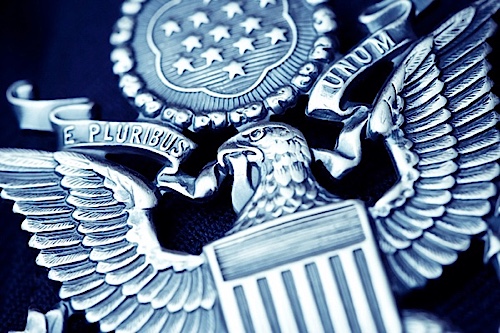 Credit: Blueberries / iStock / Getty Images Plus
Credit: Blueberries / iStock / Getty Images Plus
Applying for a cybersecurity position with the federal government? Get ready to wade through a lot of paperwork. The government wants to be sure you're a safe bet.
Government employees and federal contractors who need access to classified data must hold security clearance. Most people have heard of "top secret" clearance, but that is just one of several classifications of restricted information.
Candidates must prove good character and sound judgment to gain clearance at any level. Government agencies can deny authorization for many reasons.
According to a 2019 National Counterintelligence and Security Center report, about 4.3 million Americans hold security clearance. This number reflects those who hold confidential, secret, and top-secret clearance.
Learn more about what security clearance is, who needs it, and what you can expect from the process.
What It Means to Have Security Clearance
Security clearance is a critical designation within the U.S. national security system. By limiting access to sensitive information, the government helps prevent leaks that could damage the country's interests, its citizens, and its allies abroad.
People with security clearance may access certain classified information up to the level of their clearance. You cannot apply for security clearance. To qualify for clearance, you must work for a federal government agency or contractor, and your agency must decide that your role requires clearance. Once hired, you can begin the process of receiving clearance.
What Is a Security Clearance?
Security clearance permits access to classified national security information. The U.S. government provides this clearance only to federal employees and contractors whose job duties require secure access. Even with security clearance, an employee or contractor must prove their need to know secure information before receiving access.
1883: The Pendleton Act of 1883 established a merit-based system for hiring and overseeing government employees. This system required civil servants to show good character and reputation.
1939: In 1939, the Hatch Act expanded this concept. This act eliminated government employment for anyone who joined a political movement advocating the overthrow of the U.S. government. During World War II, an executive order mandated fingerprinting for government employees.
1954: In 1954, the Department of Energy (DOE) created a structure to protect restricted data. Eighteen years later, the Department of Defense (DOD) launched the Defense Investigation Service to put all background checks under a single unit.
1970s: Since the 1970s, the federal government has launched many more initiatives to streamline and sustain security clearances.
Frequently Asked Questions About Security Clearances
-
What does security clearance do?
Security clearance provides access to restricted areas and classified information. Candidates usually undergo an investigation through the DOD, which conducts background investigations for most federal agencies.
-
What is the highest security clearance you can get?
The federal government provides three levels of clearance: confidential, secret, and top secret. Top secret clearance is the highest security clearance level anyone can get. A candidate's responsibilities determine the level of clearance granted.
State and local law enforcement officers, for example, usually need confidential or secret clearance. Top secret clearance goes to people who need access to national security information.
-
Is it hard to get security clearance?
Yes. All candidates undergo a thorough review. Approval for any clearance level is not guaranteed. At most federal agencies, hiring officials decide if an applicant needs security clearance, and if so, at what level. For the Federal Bureau of Investigation (FBI), state and local officials who need clearance may apply.
-
What disqualifies you from getting security clearance?
Candidates may not receive clearance if the agency expresses concerns about drug or alcohol use, criminal conduct, psychological conditions, sexual behavior, or allegiance to the United States.
-
How do you prepare for a security clearance interview?
Bring your government-issued ID and any documents relevant to the interview, such as court records and financial forms. Be prepared to answer direct questions about any past misconduct.
Who Issues Security Clearances?
Government agencies that handle classified information all issue security clearances. No single agency serves as a point of contact for the entire federal government. However, the DOD conducts most background investigations.
Under reciprocity guidelines, federal agencies normally accept each other's investigations and adjudications.
Agencies that commonly require security clearances include the DOD, the Department of Homeland Security, the DOE, the Department of State (DOS), and the FBI.
- The Department of Defense provides most background checks and makes fitness decisions about federal personnel and contractors.
- The Department of Homeland Security generally provides secret clearance to state, local, private sector, territorial, and tribal entities. Governors receive top secret clearance.
- The Department of Energy provides clearance for employees working with classified information or with special nuclear material.
- The Department of State maintains the Diplomatic Security Service, which conducts background investigations for departmental employees and other agencies.
- The Federal Bureau of Investigation provides security clearance for its own employees as well as for state and local law officials who need access to classified information.
Before 2019, the Office of Personnel Management performed most background checks. In 2019, Executive Order 13869 transferred most of that power to the DOD. The DOD then created the Defense Counterintelligence and Security Agency. This agency now performs 95% of background checks for more than 100 federal agencies.
How the U.S. Government Determines Clearance
The hiring agency submits a security package containing candidate paperwork to the DOD. DOD investigators review a candidate's background, including fingerprints and criminal records. They also look at factors like education and employment history. Investigators may examine financial documents and interview friends, family, and neighbors. An adjudicator reviews the data that investigators have gathered, comparing it to 13 guidelines set by the Office of the Director of National Intelligence. These guidelines cover topics like foreign preference, sexual behavior, and psychological conditions. The adjudicator makes a decision about the candidate's clearance level. The DOD contacts the hiring agency to report the decision.
Types of Security Clearances
First signed into law in 2009, Executive Order 13526 joined other executive orders that changed how the U.S. government handles classified information. This order established a uniform classification system for sensitive information. It also provided a process for declassifying data.
The U.S. government recognizes three levels of security clearance: confidential, secret, and top secret. Using a federally mandated rubric, government officials classify documents in one of those levels. Candidates can receive clearance for information up to the level for which they qualify.
Confidential Clearance
Confidential clearance gives the holder access to information that could damage national security if leaked. A program manager or executive assistant might need confidential clearance. This clearance level requires renewal every 15 years.
Secret Clearance
Secret clearance provides access to data that, if released without authorization, could cause serious damage to national security. A counterintelligence analyst, cybersecurity analyst, or technical writer might need this clearance level. Holders must renew secret clearance every 10 years.
Top Secret Clearance / Sensitive Compartmented Information
Unauthorized release of some information could cause grave national security damage. Top secret clearance allows holders to access this information. A systems administrator or nuclear policy analyst might need top secret clearance. This clearance level requires reinvestigation every five years.
Department of Energy Authorizations
The DOE issues “L” and “Q” access authorizations. L authorization corresponds to confidential and secret clearance levels. Q authorization compares to top secret clearance.
Jobs Requiring a Security Clearance
Anyone whose job requires access to classified information or restricted areas may need security clearance. These jobs usually fall into three categories: federal and military jobs, government contractor positions, and intelligence agency roles. Specific jobs may include those below.
Cryptographer
Cryptographers use protocols to encrypt and decipher data. These senior-level cybersecurity experts may work in national security or for government contractors. They often perform risk assessments and cryptographic controls. Cryptographers usually need a bachelor's degree or higher.
Technical Writer
Technical writers develop content on emerging technologies. They can work for the DOD and other national security agencies. These experts review and analyze files to present complex information in a clear and actionable way. Technical writers often need a bachelor's degree and about five years of experience.
Security Analyst
Security analysts review and analyze network systems and organizational policies to help prevent data breaches. These professionals can work in international relations and in security-oriented jobs for contractors or agencies. This role requires a bachelor's degree and industry experience.
Counterintelligence Analyst
Counterintelligence analysts conduct criminal investigations, counterterrorism support, and counterespionage work. These professionals generally work for the FBI or DOD. This job may require experience in investigations and counterintelligence policy research.
Chief Information Security Officer
In this senior executive role, CISOs oversee an organization's technology security. They lead teams of project managers, software developers, and cybersecurity engineers. This role usually requires a bachelor's or master's degree in a related field and 15 or more years of experience.
How to Get Security Clearance
The federal government provides candidates with a step-by-step process to gaining security clearance:
-
1
Apply for a job requiring security clearance. -
2
Receive and accept a conditional job offer. -
3
Submit a questionnaire and supporting documentation to the hiring office. Separate questionnaires exist for non-sensitive, national security, and public trust positions. -
4
Wait while an investigator reviews your paperwork and completes fingerprinting and background checks. -
5
If requested, participate in an interview to verify key events in your personal timeline. -
6
Wait while an adjudicator determines eligibility for national security clearance. -
7
Receive notice from the hiring agency about the investigation's results.
Security clearance requirements vary by federal agency. However, some general guidelines govern who receives clearance and who does not.
Agencies consider factors such as allegiance to the U.S., foreign influence or preference, and financial considerations. Factors like drug and alcohol use may also be relevant. Investigators pay attention to psychological conditions, criminal conduct, outside activities, and information technology use.
Security concerns might include supporting sedition or applying for citizenship in another country. Investigators may also look out for a pattern of high-risk sexual behavior or a history of not meeting financial obligations.
A single instance of concern in any area will not necessarily disqualify an applicant. The reviewers also consider the applicant's response to the concern. Was it truthful, complete, and voluntary? Has the applicant shown positive behavior changes since the concerning incident?
The U.S. government does not discriminate on the basis of sex, race, religion, disability, national origin, or sexual orientation.
The National Counterintelligence and Security Center (NCSC) publishes a list of guidelines for evaluating clearance candidates. These guidelines cover both public and private behavior.
Anything that raises concerns about an applicant's character or background may result in their security clearance application getting denied. For example, associating with people or organizations who have attempted sedition against the U.S. will flag an adjudicator's concerns.
No single point of concern must absolutely deny a candidate, though. Adjudicators consider the seriousness, frequency, and recency of the misconduct. They examine any extenuating circumstances and analyze the likelihood of recurrence.
To address concerns, candidates should truthfully, completely, and voluntarily report all relevant information. They should also demonstrate positive behavior changes.
The rules for maintaining security clearance vary by agency and clearance level. In general, however, DOS guidelines provide a framework for security maintenance.
People must undergo reinvestigation every five years to maintain top secret security clearance. In a reinvestigation, the worker submits an updated security package, and the agency conducts a new background check.
The reinvestigation reviews the candidate's life since the last background check. The investigator may ask candidates to address any new concerns.
Agencies must also provide continuous evaluation for people covered by security clearance. Each agency decides for itself how to conduct that evaluation. Once a covered individual no longer needs security clearance — such as when they transfer from public to private sector work — the agency ends their clearance.
Additional Resources
Published by the DOS's Bureau of Diplomatic Security, this webpage provides an overview of security clearance. Readers can learn about security clearance requirements, the clearance process, interim clearance, and maintaining clearance. The page also includes frequently asked questions and contact information.
Operating within the DOD, the DCSA vets contractors and companies that do business with the federal government. This agency also helps protect contractors' technology from cybersecurity attacks.
The FBI publishes this document to help state and local law enforcement officers apply for security clearance. This clearance allows officers access to classified information. The document provides information on how to apply and answers questions such as "what is security clearance?"




Page last reviewed on Dec 7, 2022
GI Bill® is a registered trademark of the U.S. Department of Veterans Affairs (VA). More information about education benefits offered by VA is available at the official U.S. government website at https://www.benefits.va.gov/gibill/.
Recommended Reading
Take the next step toward your future.
Discover programs you’re interested in and take charge of your education.

 Reviewed by
Reviewed by